A masters in pharmaceutical sciences introduces students to each stage in the drug development process. It also includes the study of medicinal chemistry, research methods, and applications of therapeutic approaches.

You might consider this degree path if you want to enhance your knowledge and skills in pharmacology, pharmaceutics, clinical laboratory research and testing, and pharmaceutical manufacturing.
Editorial Listing ShortCode:
A pharmaceutical masters degree can also be a useful step in your professional journey if you’re interested in becoming a pharmacist, pharmacologist, or biochemist.
Universities Offering Online Master of Pharmaceutical Sciences Degree Programs
Methodology: The following school list is in alphabetical order. To be included, a college or university must be regionally accredited and offer degree programs online or in a hybrid format.
1. Drexel University
Drexel University offers an online program for an MS in Drug Discovery and Development. The curriculum is highly customizable, with over 50 advanced electives to choose from. The completion of a thesis is usually optional. Faculty are commonly active professionals who have years of experience working in the industry.
Drexel University is accredited by the Middle States Commission on Higher Education.
2. Long Island University
Long Island University offers an MS in Pharmaceutics online. Classes tend to be taught by faculty with extensive experience in both the industry and in academics. Lectures are typically live in the evenings to accommodate the schedules of working professionals. The program may be completed in 14 months.
Long Island University is accredited by the Commission on Higher Education of the Middle States Association of Colleges and Schools.
3. Ohio State University
Ohio State University offers a Master of Science in Health System Pharmacy Administration and Leadership in a full-time hybrid format or in part-time online format. The part-time program is designed for working professionals and is primarily asynchronous. The full-time program includes some on-campus residencies.
The Ohio State University is accredited by the Higher Learning Commission.
4. Roseman University
Roseman University offers an online program for a Master of Science in Pharmaceutical Sciences. The program aims to help prepare for careers in the biotech and pharmaceutical industries. The program requires the completion of 36 credit hours. The writing of a thesis is also required.
Roseman University is accredited by the Northwest Commission on Colleges and Universities.
5. South Dakota State University
South Dakota State University offers an MS in Pharmaceutical Sciences program online. The program is designed for entering with an undergraduate or professional degree in pharmacy, chemistry, biology, or a related field. The program is designed to help prepare for careers in both academia and in the pharmaceutical industry and for further study at the doctoral level.
South Dakota State University is accredited by the Higher Learning Commission.
6. Temple University
Temple University offers a part-time, online MS in Pharmaceutical Regulatory Science, designed for those who work full-time. The program does not typically require a thesis, but does require 30 credits of courses such as Small Molecules, Solid Dosage Forms, Pharmaceutical Biotechnology, and more.
Temple University is accredited by the Middle States Commission on Higher Education.
7. University of Cincinnati
The University of Cincinnati offers a Master of Pharmaceutical Sciences in Drug Development. This fully online, asynchronous program does not require any campus visits, and may be completed in 2 years. The program requires the completion of 30 credits of courses such as Statistical Principles in Clinical Research, Pharmaceutical Economics and Management, and Drug Development Project.
UC is accredited by the Higher Learning Commission.
8. University of Colorado – Anschutz
The University of Colorado–Anschutz offers an MS in Pharmaceutical Sciences program online. Specializations include Biotechnology and Drug Delivery, Molecular and Systems Toxicology, Drug Discovery, Pharmacokinetics, and Cannabis Science and Medicine.
A bachelor’s degree, or equivalent, in biology, biochemistry, chemistry, neuroscience, pharmacy, or a related field from an accredited college or university with a minimum GPA of 3.0 is required for admission.
The University of Colorado – Anschutz is accredited by the Higher Learning Commission.
9. University of Maryland
The University of Maryland offers an MS in Pharmacometrics. The program has both 5 semester and 8 semester completion plans. The program aims to teach the knowledge and skills needed to plan, perform, and interpret pharmacometric analyses, with the goal of influencing key drug development, regulatory, and therapeutic decisions. The curriculum teaches both theoretical knowledge and practical skills.
The University of Maryland is accredited by the Middle States Commission on Higher Education.
10. University of North Carolina – Chapel Hill
The University of North Carolina–Chapel Hill offers an online program for a Master of Science in Pharmaceutical Sciences with a specialization in Health-System Pharmacy Administration. Lectures are recorded and may be listened to any time. There are typically both full-time and part-time enrollment options available, and full-time attendance usually leads to completion in 2 years.
The University of North Carolina at Chapel Hill is accredited by the Southern Association of Colleges and Schools Commission on Colleges.
Masters in Pharmaceutical Sciences Programs Online
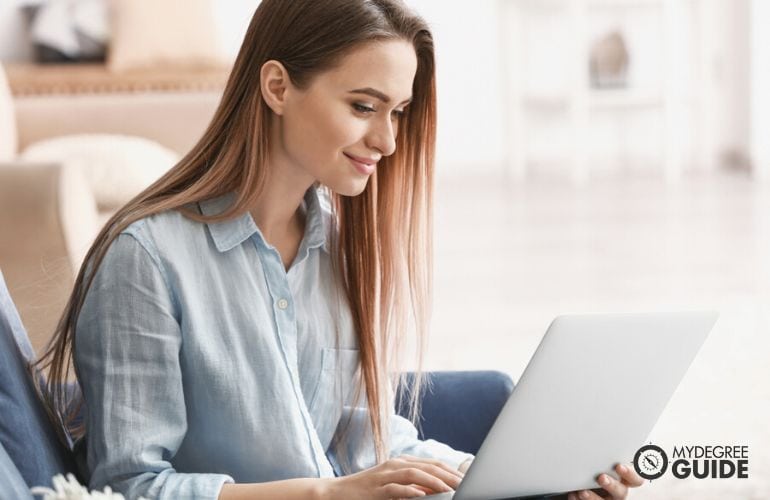
A master’s in pharmaceutical sciences focuses on the drug discovery, development, and evaluation process. In this graduate program, you can learn about drug discovery processes, including the identification of compounds that may be useful for therapeutic needs.
You can gain an in-depth understanding of the full process of drug development. This includes learning how new compounds for drugs can be discovered and used for treatments of illness and disease and how new drugs are brought to market.
Several topics in pharmaceutical sciences are explored, such as:
- Pharmacology
- Medicinal chemistry
- Pharmaceutics
- Bioinformatics
Many programs offer concentrations that focus on a sub-branch of pharmaceutical sciences. You can choose a specialization to study a specific part of the drug development process, such as discovery, pre-clinical testing, or manufacturing.
Editorial Listing ShortCode:
You can also learn how to collaborate with other healthcare professionals and providers and work with teams in a laboratory. Pharmaceutical sciences master programs could be beneficial for professionals who want to work with pharmaceuticals and research therapeutic approaches in a clinical laboratory setting.
This degree can also act as a foundation for doctoral studies. You might go on to pursue a doctoral degree if you want to become a pharmacist, biochemist, or medical scientist.
Some careers that may be attainable with a master in pharmaceutical sciences include:
- Pharmacy technician
- Clinical laboratory technologist
- Chemical technician
- Epidemiologist
- Pharmaceutical manufacturing sales representative
- Clinical research assistant
A pharmaceutical masters degree can help you develop skills and knowledge in research, application of therapeutic approaches, communication, and laboratory procedures. Graduates may also use these learned skills to pursue entry-level positions in biochemistry and medical science.
Common Online Masters in Pharmaceutical Sciences Specializations
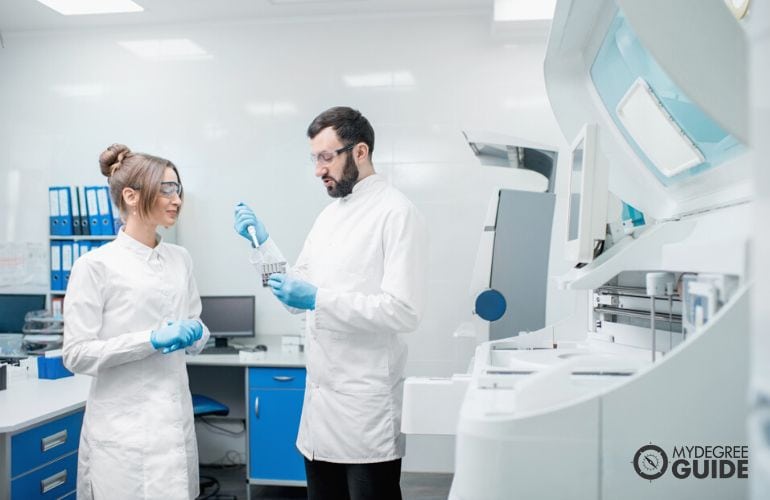
Many online masters in pharmaceutical sciences programs offer degree specializations to narrow the focus of the program and concentrate on a specific part of the drug development process. Common pharmaceutical sciences specializations include:
- Medicinal Chemistry and Drug Discovery. This specialization combines several branches of chemistry with pharmacology to teach students about the investigation process of discovering new substances to be used for therapeutic needs.
- Pharmaceutics and Drug Delivery. This concentration studies drug delivery systems, such as nanotechnology-based systems, to understand therapeutic approaches and needs.
- Biomedical Science. Students study human pathophysiology and gain an understanding of current and potential therapeutic approaches to treating illnesses, which may be useful for careers in clinical laboratories, research, or administration.
- Pharmacology. This specialization concentrates on the biological activity of drugs, including the effects of different drug compounds, and current and new drug action theories that can be applied to therapeutics.
- Pharmaceutics. The process of drug discovery and delivery is studied to gain an understanding of how drugs are prepared using therapeutic approaches to bring medical drugs to market.
Choosing a specialization could be beneficial if you’re interested in a specific pharmaceutical sciences career path.
Pharmaceutical Sciences Careers and Salaries
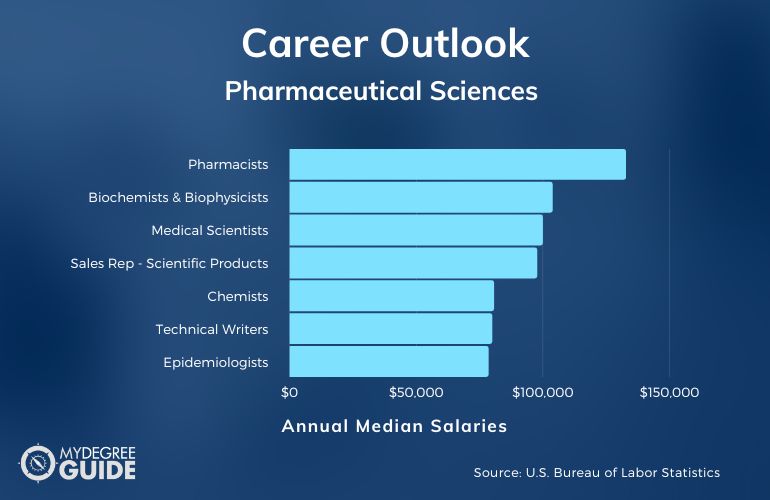
A masters in pharmaceutical sciences can be strategic for professionals currently in the pharmacology field. This degree can also be a stepping stone toward a doctoral degree for careers in pharmacology or a related field that typically requires a doctoral degree.
According to the Bureau of Labor Statistics, these are the annual median salaries of potential careers related to pharmaceutical sciences.
| Careers | Annual Median Salaries |
| Pharmacists | $132,750 |
| Biochemists and Biophysicists | $103,810 |
| Medical Scientists | $99,930 |
| Wholesale and Manufacturing Sales Representatives — Technical and Scientific Products | $97,710 |
| Chemists | $80,670 |
| Technical Writers | $79,960 |
| Epidemiologists | $78,520 |
| Clinical Laboratory Technologists and Technicians | $57,380 |
| Chemical Technicians | $50,840 |
| Pharmacy Technicians | $37,790 |
Qualifications to enter the listed occupations can vary. Some positions, such as epidemiologist, typically require a master’s degree for entry. Other positions, such as pharmacy or chemical technician, typically require some postsecondary education.
Pharmacists, biochemists, biophysicists, and medical scientists typically have a doctoral degree, such as an on-campus or online Doctor of Pharmacy degree. Pharmacologists and pharmaceutical scientists are medical scientists that study and test new drugs for therapeutic approaches. Entry-level positions in these fields may be available to masters-degree holders.
Editorial Listing ShortCode:
Salaries and job availability can differ depending on where you live, your level of education and work experience, and job demand.
MS in Pharmaceutical Sciences Curriculum & Courses

The curriculum of a master in pharmaceutical sciences focuses on all stages of the drug development process.
These are some common courses offered in a Master of Science in Pharmaceutical Sciences:
- Principles of Drug Discovery: Students gain an understanding of the pharmaceutical sciences discipline and develop foundational knowledge of the drug discovery process.
- Principles of Drug Development: This course provides an overview of the drug discovery and development processes by studying pharmaceutics, drug metabolism, and other related topics.
- Ethics and Regulation in the Pharmaceutical Sciences: Students learn about ethical practices involved in pharmaceutical research and how to conduct responsible research, data management, and recordkeeping in accordance with regulations.
- Immunology and Microbiology: Students review immunology topics and concepts by examining case studies and explore how the immune system reacts to various illnesses.
- Biostatistics: This course studies the collection, storage, and application of statistical biological data, with an emphasis on research design and analysis.
- Pharmacokinetics: This course covers the principles of pharmacokinetics, including the rate of drug absorption, distribution, and elimination within the body.
- Bioinformatics and Computational Biology: Students learn about different computational biology tools used to collect, store, and analyze biological data.
- Pharmaceutical Manufacturing Process: This course reviews drug regulations and how the properties of drug molecules are affected by the manufacturing and administration process.
- Instrumental Analysis: This is a hands-on course that examines laboratory procedures and techniques, including the study of various instruments, recordkeeping, data analysis, and the creation of scientific reports.
- Molecular Spectroscopy and Imaging: Students learn about techniques and methods used to study pharmaceutical instruments and the molecular structure of pharmaceutical substances.
If you add a specialization to your program, coursework in one area of the drug development process may be emphasized.
Admissions Requirements

These are some common admissions requirements for an MS in Pharmaceutical Sciences:
- Online application and potential fee
- Bachelor’s degree in pharmacy, biology, chemistry, or related field
- Minimum college GPA (only some schools require it)
- Personal statement
- Professional references
In order to have foundational knowledge related to pharmaceutical sciences, a bachelors degree in a related field is recommended and sometimes required.
Some colleges and universities require a minimum GPA, typically 3.0 or higher, to be considered for admissions. You may also be asked to submit a personal statement or graduate essay and professional references along with your application.
Accreditation
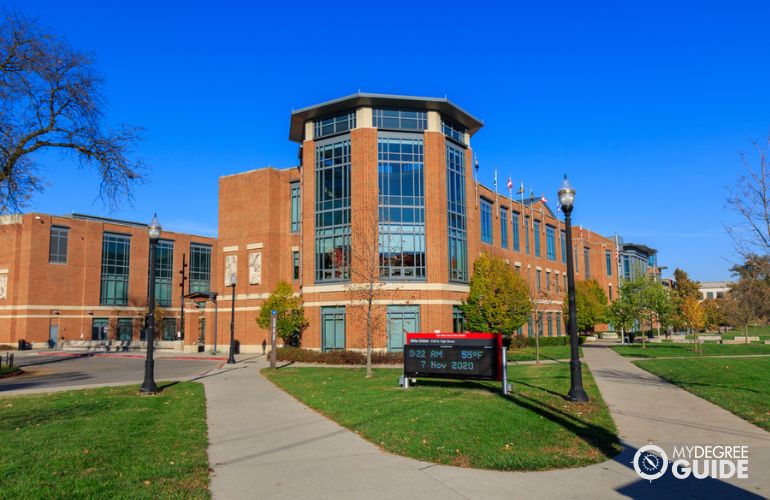
The accreditation status of a college or university can be important for future educational opportunities, employment, and federal financial aid eligibility.
Colleges and universities may seek institutional accreditation for the school and programmatic accreditation for individual programs. Third-party regional accrediting organizations recognized by the US Department of Education conduct thorough screenings of postsecondary schools to determine accreditation.
Editorial Listing ShortCode:
You can find a list of regional accrediting organizations and accredited institutions on the Council for Higher Education Accreditation (CHEA) website.
Financial Aid and Scholarships

Many graduate students seek scholarships and financial aid to help pay for some of their college expenses and cut down the upfront cost of attendance.
Your state Department of Education may provide information on state financial aid eligibility and the application process. Federal financial aid is offered by the US Department of Education, which you can apply for by submitting a Free Application for Federal Student Aid (FAFSA). You can also apply to as many scholarship opportunities as you can to potentially increase your chances of receiving one or more.
Scholarships are offered by various organizations and can have different application processes. Some scholarship applications only include a set of questions, while others request additional materials, such as an essay or professional recommendations.
What Is a Pharmaceutical Sciences Masters Degree?
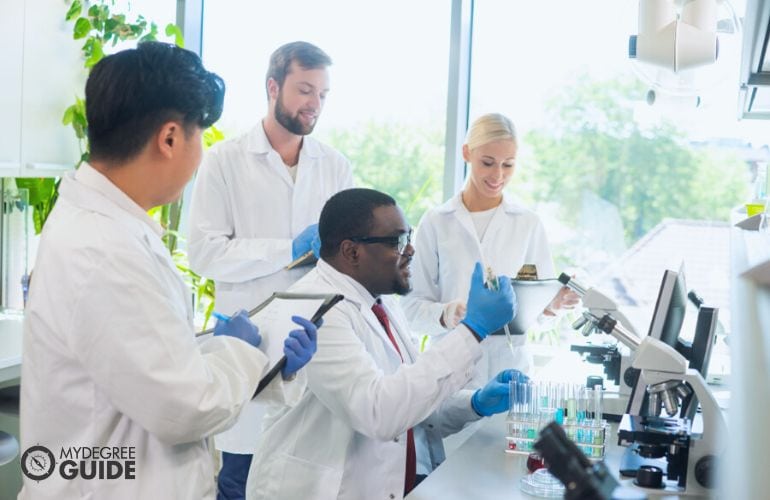
A pharmaceutical sciences masters degree is focused on the study of drug discovery, design, and development and the application of therapeutic approaches to bring new pharmaceuticals to market.
Laboratory and research-oriented coursework in the program is designed to teach you essential knowledge about the disciplines of pharmaceutical sciences. The curriculum also introduces you to techniques and methods used to examine and experiment with compounds of substances that may be useful for therapeutics. Coursework essential to understanding each phase of the drug development process is offered as well.
What Can I Do with a Masters in Pharmaceutical Sciences?
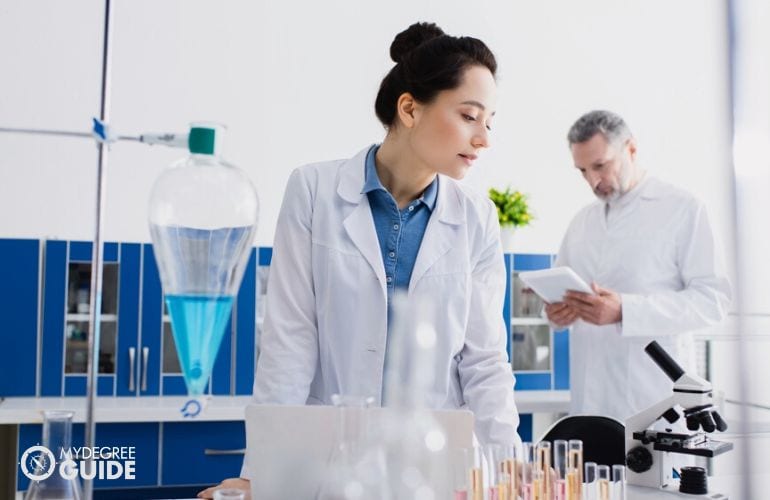
A master’s in pharmaceutical sciences can be useful for many healthcare and scientific careers. Many professionals seek a master’s in pharmaceutical sciences before applying for a doctoral program. Pharmacists and pharmacologists typically hold a Doctor of Pharmacy (PharmD), medical degree, or PhD. A masters degree may be useful for gaining entry into these doctoral programs.
Careers that may be attainable with an MS in Pharmaceutical Sciences include epidemiologist, pharmacy technician, medical writer, pharmaceutical sales representative, regulatory affairs manager, and clinical laboratory technologist. Graduates may also pursue entry-level positions in biochemistry and clinical research.
How Long Does It Take to Get a Master in Pharmaceutical Science Online?

A 36 credit hour non-thesis master’s in pharmaceutical sciences online program may be completed in 1 year with full-time study, including summer coursework. If you’re unable to take courses during the summer, a masters program may be completed in 2 years or less.
Editorial Listing ShortCode:
If a thesis is required, or if the program includes more credit hours, it can take more time. Some programs may replace a thesis with a capstone project at the end of the program. Part-time enrollment can extend the length of your program as well.
What’s the Difference Between a Pharmacology vs. Pharmaceutical Science Masters Degree?
Pharmacology is a branch of pharmaceutical sciences and may be offered as a separate masters program.
| Masters in Pharmacology | Masters in Pharmaceutical Sciences |
|
|
Pharmacology masters programs emphasize the study of certain compounds and how drugs may interact with the human body. Pharmaceutical sciences is more broad, as it explores the entire drug development process.
Is a Master’s Degree in Pharmaceutical Sciences Worth It?
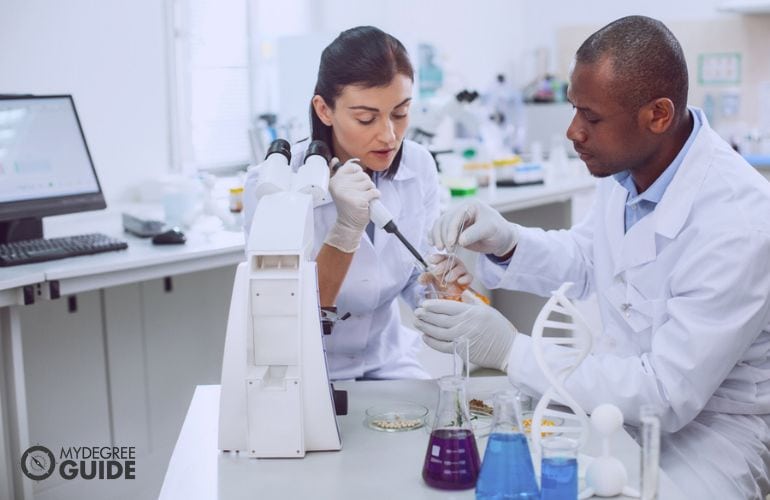
Yes, a master’s degree in pharmaceutical sciences is worth it for many students. This degree can be beneficial if you plan on entering a pharmaceutical sciences career that requires an advanced degree. It can also be helpful for enhancing your knowledge and skills about the drug development cycle, which can be applied to numerous healthcare and research positions.
Editorial Listing ShortCode:
There are several careers in the pharmaceutical sciences field projected to have as fast as average or faster than average job growth. For example, epidemiologists are projected to see 26% job growth over the next ten years (Bureau of Labor Statistics).
Getting Your Master of Pharmaceutical Sciences Online

A masters in pharmaceutical sciences could be beneficial to you if you’re interested in research and want to study how drugs are discovered, designed, developed, and manufactured. It’s often the next step after completing on-campus or online pre-pharmacy programs.
The process of developing drugs for therapeutics takes a large team of researchers, technicians, scientists, and other professionals to bring medicinal drugs to market. You could target a specific area of drug development by adding a specialization to your masters program.
If you’re ready to start your graduate journey in pharmaceutical sciences, you can begin by researching accredited institutions and programs that best support your interests and career goals.
